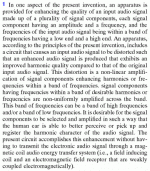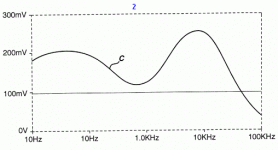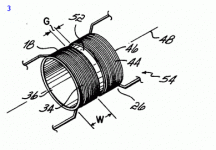Speaking of distortion.. You were doing fine up to a point.
Then you jumped to a presumption. Its not a matter of simply making the volume louder. That can always be adjusted to see what it really does. Those reviewing the TDS took this into account.
But the average person will not.
What it can do is to bring back sounds that were buried in the mix.
No, it can't.
It's a distortion generator. All it can do is distort the signal fed into it.
There is more to it than mere speculation alone will reveal.
All there is to it is some poor quality transformers used as distortion generators.
se
No, it can't.
It's a distortion generator. All it can do is distort the signal fed into it.
I hope your doctor did not tell you that you need reading glasses. (for they they distort the image fed into them!)
I used to play live music. Back in the days of of my beginnings it was common for instrumentalists to use a reverb effect that was very pleasing and exciting to hear.
Now..
I have been watching a video of a famous instrumental group that was touring and nationally adored in Japan. They were playing a medley of their hits. The audio engineering was top notch. The sound is gorgeous.
Mind you, I thoroughly enjoyed what I saw and heard before having my TDS. Then, I added it to my set up. All of a sudden a very distinct reverb popped out like it really sounds live. But, the rest of the music sounded just like before. How does any distortion discriminate in what it will and will not distort???
Distortion alone just can't do that. It was as if someone at the mixing board moved a volume slider up on only one thing, and nothing else. That is why this device confounds those who have witnessed to this factor. You can argue all you want. I know what I am hearing. And, I know what I used to hear when this effect was used when playing live. What I heard with it was not there before the TDS was in the circuit.
As one reviewer stated:
[FONT=Arial,Helvetica,Geneva,Swiss,SunSans-Regular]How the TDS does all this is a mystery to me. What the manufacturer says about their patented technology is that it restores the harmonic spectrum to audio signals by "introducing a non-linear amplitude distortion of select frequencies.[/FONT][FONT=Arial,Helvetica,Geneva,Swiss,SunSans-Regular]" It is clearly an additive process. But on the evidence of what I'm hearing, this is Strike-1 against the purist theory. It is correcting some weakness that our components don't address.[/FONT]
Welcome to TDS Audio
[FONT=Arial,Helvetica,Geneva,Swiss,SunSans-Regular] It is correcting some weakness that our components don't address. [/FONT]
Like eye glasses correct what our aging eyes can not focus on and distorts. The TDS counter distorts. Yes, it distorts. Its a counter distortion of a distortion.
I used to play live music.
So? I don't care what you played. That doesn't change the fact that the TDS is a distortion generator which can only distort the signal fed into it.
It can't replace what was lost in the mix because it has absolutely no idea what was in the mix before it was lost in the mix, unless you're attempting to argue that the TDS is some sort of prescient being.
se
So? I don't care what you played. That doesn't change the fact that the TDS is a distortion generator which can only distort the signal fed into it.
I makes me able to recognize what I am hearing. I think you could have just stopped with the word "care." You enjoy arguing.
That's why recording engineers were solicited for its evaluation. They knew what was lost in the recording process. The invention began with being used my movie and recording engineers not the general audio loving public.It can't replace what was lost in the mix because it has absolutely no idea what was in the mix before it was lost in the mix, unless you're attempting to argue that the TDS is some sort of prescient being.
Now.. Again!
Eye glasses. They are a controlled distortion generator. For, if you do not have a vision deficiency? They will distort what you see. But, they will make clear your vision if your eyes are distorting what you see. Yet? According to your logic? Because they generate distortion? Eye glasses are bad (for the so called purist).
Not all distortion is bad, if in fact a controlled distortion is the means for correcting an inherent distortion that purists do not know how to measure for. For, how can they? They do not even know it exists! Yet we can read comments given by top recording engineers who saw parts of what they recorded being restored with the TDS, that originally after what was recorded was lost and buried in the recording process.
My system now wears glasses. (you can't see that.)
Last edited:
As we said, you can't correct by distortion unless you know exactly what distortion you are correcting. This is where the spectacles analogy breaks down. We can agree what 'in focus' means and have opticians' charts to prove it. There is not an audio analogue.
On the other hand, it is relatively easy to make something sound more impressive. Boost some frequencies, add a little low-order distortion, roll off the HF end a little. It is conceivable that the low frequency IMD resulting from low-order distortion could be mistaken for reverberation so will improve the 'space' of a recording.
On the other hand, it is relatively easy to make something sound more impressive. Boost some frequencies, add a little low-order distortion, roll off the HF end a little. It is conceivable that the low frequency IMD resulting from low-order distortion could be mistaken for reverberation so will improve the 'space' of a recording.
As we said, you can't correct by distortion unless you know exactly what distortion you are correcting.
The reason for laser surgery for correcting vision defects was discovered by chance. Actually, by accident. It had to be studied after to figure out why it works.
You mean to say that men understood how a magnifying glass worked before they saw what it did?This is where the spectacles analogy breaks down. We can agree what 'in focus' means and have opticians' charts to prove it. There is not an audio analogue.
You are missing what some of the most authoritative reviewers stated. When recording engineers did their evaluation, they found that the TDS restored certain parts of the music that was lost. Lost aspects they heard while they were recording. Things that are no longer heard after the mix were heard once again in playback. One engineer explained that this was a common occurrence in professional recording. They found the TDS restored lost parts. You are saying that distortion or boosting frequencies alone can do that? The engineers could not before. They just accepted it as a part of the art.On the other hand, it is relatively easy to make something sound more impressive. Boost some frequencies, add a little low-order distortion, roll off the HF end a little. It is conceivable that the low frequency IMD resulting from low-order distortion could be mistaken for reverberation so will improve the 'space' of a recording.
No distortion generator can restore lost parts... unless it acts like audio eye glasses, and causes a refocus of what went out of focus. I think we just do not know yet what it is that the TDS is correcting to know how it restores what gets buried in the mix. Simply turning up the treble alone can not do that. What I heard restored did not sound brighter. It suddenly appeared as part of the music. I was surprised. I never knew a certain sound was there.
As far as hearing the high and low end? According to scientific research it should be EQ'd when played at lower levels. Because, as you know, our ears require a certain amount of EQ boost when we are listening to music being played at a lower volume than what was actually played. Some EQ is needed to hear a balance in the full spectrum when playback is played at a lower volume level than the original performance.. After all? The Fletcher Munson curve was the result of scientific testing.
In the past the Fletcher Munson curve was rarely (if ever) been able to be implemented in a precise way. Speakers back when the curve was commonly used were not that accurate to begin with. It just could not work with accuracy. What the curve in the TDS does with today's more accurate playback is a new world. Its like when some re-introduced tubes after speakers finally reached a point of perfection that did not exist when tubes were the norm. Tubes were re-discovered like never before because other technologies advanced.
I hear a very natural balance in the frequency response the TDS produces. It does not sound like the treble or bass is electronically boosted. It sounds very natural. Before it sounded like too little bass and treble at lower levels. Most of us listen at lower levels. If we did not? The band would sound like its in our room in front of us.
How many here that speak against the TDS have actually lived with one in their system? So far I only see naysayers. At best, intelligent guessing, but not knowing all the TDS really does.
Last edited:
A guy I occasionally work with deals in extreme, and very expensive studio esoterica, with a worldwide client base. I was chatting to him on the phone today, and he had never heard of this device.
I found out about it from someone who sells high end equipment. Its no longer manufactured. Poor marketing apparently did them in.
To compare the TDS to corrective lenses is beyond absurd. There is absolutely no such analog going on with the TDS.
The proper analogy would be the Vaseline used on the lenses of Penthouse photographers to give a more aesthetically pleasing, though decidedly distorted, "soft" focus.
se
The proper analogy would be the Vaseline used on the lenses of Penthouse photographers to give a more aesthetically pleasing, though decidedly distorted, "soft" focus.
se
To compare the TDS to corrective lenses is beyond absurd. There is absolutely no such analog going on with the TDS.
The proper analogy would be the Vaseline used on the lenses of Penthouse photographers to give a more aesthetically pleasing, though decidedly distorted, "soft" focus.
se
I have a TDS,and unlike you, listen to it. Just got it last week.
You are simply being negative and do not know what's true. I know you do not know. For that is not what it does. Switching it in and out does not always reveal a noticeable difference. It all depends on the source as to what it will bring out.
Patents etc
Interesting, sort of
I found a number of Patents for this, which include many abandoned ones, & continuations !
Images 1 & 2 are from US 6,275,593 2001
Image 3 is from US 5,361,306 1994
Looks like a tone control to me, with or without some distortion added ! Doesn't mean it's bad of course, whatever floats your boat
I didn't find the original Patent in the time i had, so if someone finds it please post the # I was hoping to see drawings etc for the passive version, but ONLY saw active ones ?
Also i found a digital Patent version of it !
Interesting, sort of
I found a number of Patents for this, which include many abandoned ones, & continuations !
Images 1 & 2 are from US 6,275,593 2001
Image 3 is from US 5,361,306 1994
Looks like a tone control to me, with or without some distortion added ! Doesn't mean it's bad of course, whatever floats your boat
I didn't find the original Patent in the time i had, so if someone finds it please post the # I was hoping to see drawings etc for the passive version, but ONLY saw active ones ?
Also i found a digital Patent version of it !
Attachments
Looks like a tone control to me, with or without some distortion added ! Doesn't mean it's bad of course, whatever floats your boat
My boat likes it. Audiophiles with more advanced systems than I have , also like it.
Here is how it started. I asked how it works. Not, how someone dislikes how it works.
If pure skimmed milk is someone's preference? That's fine with me. I prefer some thickener added because of what I can sense was taken out.
Now if anyone can produce an audio system that produces music that is indistinguishable from the original performance? Then that person alone has the right to be critical of any of these 'helps' that have been invented by others aimed at improving our listening experience.
Zero D, thanks for your answer.
Without a clear description, and a circuit diagram, it is difficult to do much more than this.GeneZ said:At best, intelligent guessing, but not knowing all the TDS really does.
And, in general terms, we told you how it works. Frequency response shaping (loudness control - mentioned on their website) plus some distortion (mentioned in the patent) created probably by transformer core hysteresis (in the passive version). You just didn't like our answer.I asked how it works.
If you like what it does, fine. Don't be upset because we would not want one in our system.
If you like what it does, fine. Don't be upset because we would not want one in our system.
That does not upset me. They will not die of cancer if they do not get one.
The thing that truly amuses me is that these folks somehow think that they are not listening to all sorts of distortions to begin with.
Can you open it up and take some pictures to post here? I imagine the patent(s) show everything (I haven't looked), but seeing the actual components may be a little enlightening.I can not be a TDS salesman because this is a discontinued product. I just picked mine up dirt cheap. Built solid like a brick. Heavy steel casing.
The mention of adding distortion reminds me of the Aphex Aural Exciter as first used in studios in the 1970's. I think I read in some hifi magazine an article that described it and railed against it. The Eagles album "The Long Run" famously had a note saying "This album was NOT processed using an Aphex Aural Exciter."
That does not upset me. They will not die of cancer if they do not get one.
The thing that truly amuses me is that these folks somehow think that they are not listening to all sorts of distortions to begin with.
You're making that all too common fallacy of associating your positive impressions with an improvement in accuracy. Go ahead, use it, love it. Just don't argue that it's able to drive more towards "accuracy".
Sorry, which folks would that be? People who are aware that they are listening to unavoidable distortions will usually not want to add any more to the mix. As we keep saying, and you keep either ignoring or failing to understand, you can only cancel an existing distortion if you know exactly what it is and add an inverse function. Failing to do this simply adds further distortion.GeneZ said:The thing that truly amuses me is that these folks somehow think that they are not listening to all sorts of distortions to begin with.
Let's say you have a sound reproduction chain which is quite good but has some second-order distortion. To correct this you need to add infinite-order distortion of exactly the right shape and amount. (Yes, that's right, the inverse of second-order is infinite-order). Anything else will add higher-order distortion to the existing second-order. Real life is not that simple (it is worse!) but anyone who understands maths can see why some of us would rather live with unavoidable distortion than try, and fail, to correct it.
You're making that all too common fallacy of associating your positive impressions with an improvement in accuracy. Go ahead, use it, love it. Just don't argue that it's able to drive more towards "accuracy".
I am not arguing that it creates greater accuracy. It compensates in a fashion. A person who wears braces, and can now walk without crutches, does not have his legs restored. Others would rather use the same improved crutches as everyone else. Yet, none of us have our legs restored. I am not arguing that this restores the legs of my system. Just another means to cope with its limitations.
- Status
- This old topic is closed. If you want to reopen this topic, contact a moderator using the "Report Post" button.
- Home
- General Interest
- Everything Else
- Any Insight? TDS -True Dimensional Sound - How it works?


